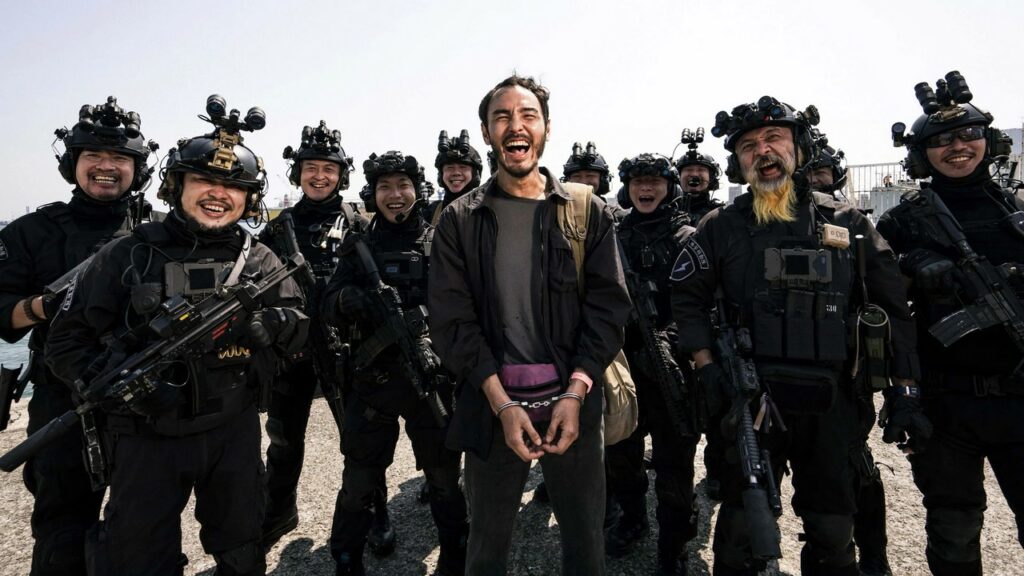
The Pig, The Snake and The Pigeon
A Brutal, Bizarre & Brilliant Crime Saga About A Killer’s Legacy
Every so often, a film emerges that defies easy categorization, becoming a cultural phenomenon for reasons as complex and contradictory as its own narrative. The Pig, the Snake and the Pigeon is precisely such a film. This Taiwanese black comedy action thriller, directed by Hong Kong’s Wong Ching-po, achieved only modest success in its home market but exploded into a viral, record-breaking blockbuster in Mainland China, captivating audiences with its blend of brutal violence, dark humor, and profound philosophical inquiry. Its subsequent arrival on Netflix introduced this singular vision to a global audience, proving that its story of a hitman’s quest for legacy resonates far beyond its cultural origins.
Every so often, a film emerges that defies easy categorization, becoming a cultural phenomenon for reasons as complex and contradictory as its own narrative. The Pig, the Snake and the Pigeon is precisely such a film. This Taiwanese black comedy action thriller, directed by Hong Kong’s Wong Ching-po, achieved only modest success in its home market but exploded into a viral, record-breaking blockbuster in Mainland China, captivating audiences with its blend of brutal violence, dark humor, and profound philosophical inquiry. Its subsequent arrival on Netflix introduced this singular vision to a global audience, proving that its story of a hitman’s quest for legacy resonates far beyond its cultural origins.
The film is a dizzying, genre-bending experience. It begins as a stylish, kinetic gangster thriller before abruptly shifting gears into a surreal, slow-burn drama centered on a manipulative cult. At its heart is a compellingly absurd premise: Chen Kui-lin, a notorious and arrogant hitman, discovers he is dying of cancer and decides the only way to leave a meaningful mark on the world is to eliminate the only two criminals on Taiwan’s most-wanted list more infamous than himself. What follows is a bizarre, violent, and surprisingly poignant journey of redemption that questions the very nature of good, evil, and the meaning of a life lived on the fringes of society.
A Killer’s Quest for Meaning: Plot Synopsis
The story centers on Chen Kui-lin (Ethan Juan), Taiwan’s third most-wanted criminal, a man whose life of violence has left him with little but notoriety. His world is upended by two simultaneous events: the death of his beloved grandmother, his last connection to a normal life, and the (mistaken) news from his underworld doctor that he has terminal lung cancer. With his past severed and his future erased, Chen is adrift. In a moment of existential crisis, he decides to turn himself in.
However, while waiting at the police station, a moment of profound vanity changes his course. He sees the “Top 10 Most Wanted” list and is incensed to find he is ranked only third. This blow to his ego, combined with a desperate need to be remembered for something more than just being another criminal, ignites a new purpose. He will not fade away; he will go out in a blaze of glory. His mission becomes clear: hunt down and eliminate the top two fugitives, “Hongkie” and “Bullhead,” thereby cementing his legacy as the most infamous outlaw in Taiwanese history.
This quest is a modern reinterpretation of the ancient Chinese fable of Zhou Chu, a brutish young man who, upon learning he is one of the “three scourges” terrorizing his village, eliminates a tiger and a dragon before reforming himself. Chen’s journey to eliminate his two rivals is his attempt to eradicate the other “evils,” a path that forces him to confront his own nature. Running parallel to this is the underdeveloped but persistent thread of Detective Chen Hui (Lee Lee-zen), who relentlessly pursues Chen after losing an eye to him in the film’s explosive opening chase, creating a classic, if backgrounded, cat-and-mouse dynamic.

A Star-Making Turn: Ethan Juan’s Captivating Anti-Hero
At the core of The Pig, the Snake and the Pigeon is a powerhouse, award-winning performance from Ethan Juan that is nothing short of a career redefinition. The film’s entire moral compass, or lack thereof, rests on his shoulders. He portrays Chen Kui-lin not as a simple villain, but as a complex anti-hero, a man of startling contradictions. He is arrogant, brutally violent, and driven by an almost childlike desire for fame, yet he possesses a strange innocence and a fierce, if warped, code of honor. Juan masterfully navigates these turbulent waters, making a mass murderer not just watchable, but strangely sympathetic.
This sympathy is crucial, and it’s largely achieved by contrasting Chen with the film’s other antagonists, who are depicted as irredeemably vile. Ben Yuen’s Hongkie (the Snake) is a preening, abusive monster, while Chen Yi-wen’s Bullhead (the Pigeon) is a charlatan of the highest order, a cult leader who preys on the desperate for material gain. Against their pure malevolence, Chen’s violence, often directed at those who harm the innocent, begins to look like a form of righteous justice. His quest may be born of ego, but it results in the elimination of genuine evil, a paradox that Juan embodies with every conflicted glance and burst of action.
The supporting cast serves their purpose, primarily to illuminate facets of Chen’s character. Gingle Wang is effective as Hsiao-mei, the damsel-in-distress whose rescue allows Chen’s protective instincts to surface, while Lee Lee-zen provides a sturdy, if underutilized, presence as the determined detective. Ultimately, however, this is Juan’s film, and his performance is the anchor that allows the audience to invest in a story that constantly challenges their moral footing.
A Tale of Two Movies: Wong Ching-po’s Direction and Tonal Whiplash
Director Wong Ching-po, a Hong Kong native, brings a distinct cinematic sensibility to this Taiwanese production, resulting in a film that feels like two different movies stitched together—a choice that is both its most audacious quality and its most divisive. The first half of
The Pig, the Snake and the Pigeon is a masterclass in kinetic action filmmaking. The opening foot chase and the subsequent hunt for Hongkie are executed with the brutal efficiency and stylish flair of classic Hong Kong crime thrillers, filled with visceral, close-quarters combat and white-knuckle tension. Cinematographer Jimmy Wong captures these sequences with a dynamic energy that is both thrilling and unflinchingly raw.
Then, the film takes a hard left turn. The frenetic pace grinds to a halt as Chen enters the world of the New Soul Society, and the narrative transforms into a slow-burn, atmospheric psychological drama. The camera becomes more observational, the editing more deliberate, and the score shifts from propulsive beats to an unsettling, ambient hum. This jarring shift has been a point of contention for many, who see it as a structural flaw that kills the film’s momentum.

However, this tonal whiplash can be read as a deliberate and brilliant narrative strategy. It mirrors Chen Kui-lin’s own internal journey. The first half, with its focus on external violence and the pursuit of infamy, reflects his shallow, ego-driven worldview. The second half forces him—and the audience—to confront a more insidious form of evil: not the physical threat of a rival gangster, but the spiritual corruption of a manipulative cult. His quest evolves from a physical one to a philosophical one, and the film’s structure boldly reflects this transformation. The “uneven” pacing is not a bug; it’s a feature, a daring directorial choice that makes the film’s thematic ambitions clear.
The Three Poisons: Unpacking The Film’s Rich Symbolism
To fully appreciate The Pig, the Snake and the Pigeon, one must look beyond its surface as a crime thriller and engage with its deep allegorical layers. The film’s Chinese title, Zhou Chu Chu San Hai (Zhou Chu Eliminates the Three Scourges), is a direct reference to a classic Chinese fable about redemption, providing a powerful cultural framework for mainland audiences. But its English title points to an even deeper, more universal layer of meaning rooted in Buddhist philosophy.
The pig, the snake, and the pigeon are representations of the “Three Poisons” (Triviṣa) that sit at the hub of the Buddhist Wheel of Life, driving the cycle of suffering: Greed, Hatred, and Delusion.
- The Pig (Chen Kui-lin): Symbolizing delusion or ignorance (moha), Chen is driven by a false premise (his cancer) and a deluded belief in the value of a violent legacy. The pig-faced watch his grandmother gave him serves as a constant, poignant reminder of his state.
- The Snake (Hongkie): Symbolizing hatred or aversion (dveṣa), Hongkie is a creature of pure brutality and anger, ruling his small domain through violence and sexual abuse.
- The Pigeon (Bullhead): Symbolizing greed or attachment (rāga), Bullhead, as the cult leader, preaches spiritual detachment while secretly hoarding his followers’ worldly possessions in a lavish, hidden apartment.
The film’s most profound statement comes from how Chen deals with these evils. He dispatches the Snake with relative ease, meeting violence with superior violence. But the Pigeon, the embodiment of greed and spiritual manipulation, proves a far more difficult and insidious foe. Chen is initially taken in by the cult’s promises, nearly losing his life not to a weapon, but to deception. His ultimate confrontation with this evil is the film’s most shocking sequence. After exposing and killing Bullhead, he offers the cultists a chance to leave. Those who remain, choosing willful delusion even after the truth is revealed, are systematically executed. This brutal climax suggests that while physical violence can be fought, the poison of willful ignorance is a far greater scourge, one that Chen feels compelled to eradicate completely, pushing the film into a realm of terrifying moral ambiguity.

How A Taiwanese Sleeper Hit Conquered The Mainland
The box office performance of The Pig, the Snake and the Pigeon is a story in itself. After a respectable but unremarkable run in Taiwan, grossing around $1.6 million USD, the film became a cultural juggernaut in Mainland China, earning over $90 million USD and dominating the box office for weeks. This rare success for a Taiwanese film in the mainland market can be attributed to a potent cocktail of cultural resonance and savvy marketing.
The film’s narrative taps directly into the xia, or chivalrous hero, archetype deeply ingrained in Chinese culture—the righteous outlaw who operates outside a corrupt or ineffective system to deliver justice. The use of the well-known Zhou Chu fable provided an instant and powerful thematic entry point for audiences. Furthermore, the film’s visceral takedown of a manipulative cult was intensely cathartic for a populace familiar with the state’s messaging against groups like Falun Gong, to the point where the CCP itself seemed to promote the film as a cautionary tale.
The Taiwanese setting also likely played a role, allowing the film to explore themes of societal decay and institutional failure—the police are portrayed as largely ineffective—with a freedom that a mainland-set production would likely be denied. This provided mainland audiences with a taste of the gritty, morally complex storytelling they often crave but which is frequently absent from the state-sanctioned diet of patriotic blockbusters and light comedies. This hunger for something different was amplified by viral marketing on platforms like Douyin, where the film’s shocking scenes and charismatic anti-hero became a sensation, propelling it from a niche release to a must-see event.
Final Verdict
The Pig, the Snake and the Pigeon is a messy, audacious, and utterly unforgettable film. It is anchored by a phenomenal, star-making performance from Ethan Juan, who transforms a violent killer into a compelling figure of tragic redemption. While its jarring tonal shift and underdeveloped supporting cast may be off-putting for some, these perceived flaws are integral to its thematic ambition. Director Wong Ching-po has crafted a film that succeeds on multiple levels: as a brutal action-thriller with expertly choreographed set pieces, as a dark comedy with a wicked sense of humor, and as a profound philosophical meditation on legacy, mortality, and the nature of evil. It is a rare film that manages to be both wildly entertaining and deeply thought-provoking, leaving a lasting impression long after the credits roll. It stands as one of the most exciting and significant genre films in recent memory.
| Film Details | |
| Director | Wong Ching-po |
| Writer | Wong Ching-po |
| Key Cast | Ethan Juan, Ben Yuen, Chen Yi-wen, Gingle Wang, Lee Lee-zen |
| Release Dates | Taiwan: October 6, 2023; Hong Kong: November 2, 2023; China & Netflix: March 1, 2024 |
| Runtime | 134 minutes |
| Performance & Reception | |
| Box Office (Approx.) | Taiwan: ~$1.6M USD; Hong Kong: ~$250k USD; China: ~$90M+ USD |
| IMDb Rating | 7.3/10 |
| Douban Score | 8.1/10 |
| Rotten Tomatoes | N/A (Tomatometer), 84% (Audience Score) |
| Key Awards | Golden Horse Award (Best Action Choreography); Hong Kong Film Award (Best Asian Chinese Language Film); Taipei Film Awards (Best Actor, Best Supporting Actor) |
